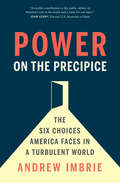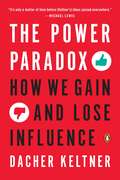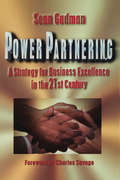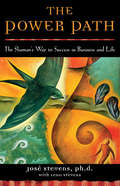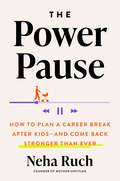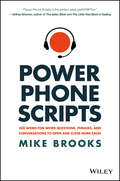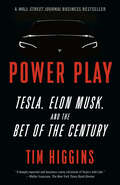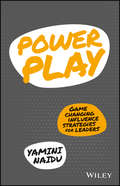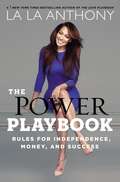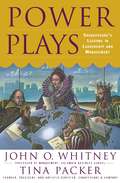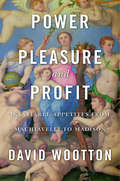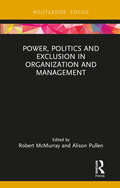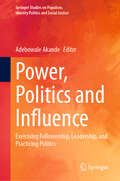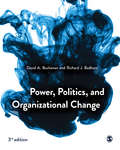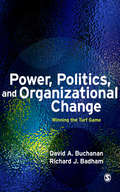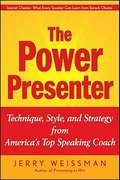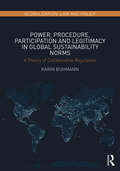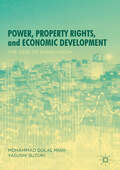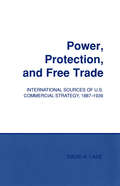- Table View
- List View
Power on the Precipice: The Six Choices America Faces in a Turbulent World
by Andrew ImbrieAn essential guide to renewing American leadership in a turbulent, polarized, and postdominant world Is America fated to decline as a great power? Can it recover? With absorbing insight and fresh perspective, foreign policy expert Andrew Imbrie provides a road map for bolstering American leadership in an era of turbulence abroad and deepening polarization at home. This is a book about choices: the tough policy trade-offs that political leaders need to make to reinvigorate American money, might, and clout. In the conventional telling, the United States is either destined for continued dominance or doomed to irreversible decline. Imbrie argues instead that the United States must adapt to changing global dynamics and compete more wisely. Drawing on the author’s own experience as an adviser to Secretary of State John Kerry, as well as on interviews and comparative studies of the rise and fall of nations, this book offers a sharp look at American statecraft and the United States’ place in the world today.
The Power Paradox: How We Gain and Lose Influence
by Dacher KeltnerA revolutionary and timely reconsideration of everything we know about power. Celebrated UC Berkeley psychologist Dr. Dacher Keltner argues that compassion and selflessness enable us to have the most influence over others and the result is power as a force for good in the world.It is taken for granted that power corrupts. This is reinforced culturally by everything from Machiavelli to contemporary politics. But how do we get power? And how does it change our behavior? So often, in spite of our best intentions, we lose our hard-won power. Enduring power comes from empathy and giving. Above all, power is given to us by other people. This is what all-too-often we forget, and what Dr. Keltner sets straight. This is the crux of the power paradox: by fundamentally misunderstanding the behaviors that helped us to gain power in the first place we set ourselves up to fall from power. We can't retain power because we've never understood it correctly, until now. Power isn't the capacity to act in cruel and uncaring ways; it is the ability to do good for others, expressed in daily life, and itself a good a thing.Dr. Keltner lays out exactly--in twenty original "Power Principles"-- how to retain power, why power can be a demonstrably good thing, and the terrible consequences of letting those around us languish in powerlessness.
Power Partnering
by Sean GadmanPower Partnering is a brilliant yet refreshingly simple approach that breaks innovative thinking and acting down into four distinct contexts, allowing people to respond to complex situations in highly creative and innovative ways. In the not too distant future, successful companies will be defined by their ability to manage their knowledge assets. Power partnering is one very important strategy for success. It avoids the pitfalls inherent in traditional approaches to running businesses, particularly those that emphasize 'power over and control of' people. This book is concerned with creating environments of interaction where co-workers, customers, suppliers and customers' customers interact in meaningful and creative ways. These environments promote new ways of thinking, insightful perspectives and fresh ideas.
The Power Path
by Lena Stevens José StevensAccording to José Stevens and Lena Stevens, business leaders and shamans share many important traits: the abilities to solve problems, to achieve goals, to see the big picture, and to forecast events. What their previous book, Secrets of Shamanism, did for the growth of the individual, The Power Path does for the growth of business managers and entrepreneurs. On the basis of years of study with shamans, the authors share a new way of thinking about the nature of power. By applying shamanic traditions of power to the workplace, readers learn how to improve work relationships, to understand employees' strengths and limitations, and to inspire effective teamwork -- techniques aimed ultimately toward increasing business success.
The Power Pause: How to Plan a Career Break After Kids--and Come Back Stronger Than Ever
by Neha RuchINSTANT USA TODAY BESTSELLER!A paradigm-shifting guide to career breaks after kids that rebrands stay-at-home parenthood for a new generation of women and families."So, what do you do?" When Neha Ruch had to answer this seemingly innocent question for the first time after leaving her corporate job to care for her infant son, she drew a shameful blank. She couldn&’t find the words to describe this new stage of life she&’d just embarked on. She wasn&’t a 1950s June Cleaver type, nor was she one of today&’s updated stereotypes. (Craft Project Mom? Exhausted-in-Sweatpants Mom?) How, then, was she to navigate this identity shift?Frustrated, Ruch embarked on a mission to rebrand the stay-at-home mother for a new generation of women who don&’t want to leave their ambition behind just because they decide to pause or change their careers post-kids. Her online community, Mother Untitled, has become the leading voice and resource for women navigating this transition. In The Power Pause, Ruch addresses all the questions women face at this inflection point, such as, Can I afford to pause? Who am I without my career identity? How do I find meaning in the role? And can I ever transition back to paid work?With expert advice and diverse stories of stay-at-home mothers who buck every stereotype, as well as interactive exercises to help the reader plot a course for the long term, The Power Pause is an essential handbook for a new generation of caregivers.
Power Phone Scripts: 500 Word-for-Word Questions, Phrases, and Conversations to Open and Close More Sales
by Mike BrooksStart closing sales like top producers! Have you ever found yourself at a loss for what to say when the gatekeeper asks you what your call is about? Have your palms ever sweated when the decision maker shuts you down with: “I wouldn’t be interested”? Has your heart taken a fast dive into your stomach when, at the start of your presentation, your prospect tells you that they’ve thought about it and are just going to pass? If you’re in sales, then the question isn’t “Have you ever felt this way?”, but rather, “How often do you feel this way? Are you finally ready to learn how to confidently and effectively overcome these objections, stalls, and blow-offs? If so, Power Phone Scripts was written for you! Unlike other books on sales that tell you what you should do (like build value – hard to do when the prospect is hanging up on you!), Power Phone Scripts provides word-for-word scripts, phrases, questions, and comebacks that you can use on your very next call. Learn to overcome resistance, get through to the decision maker, and then, once you have him or her on the phone, make an instant connection and earn the right to have a meaningful conversation. You’ll be equipped with proven questions, conversation starters, and techniques to learn whether or not they are even right for your product or service, and, if they aren’t, who else in their company or another department might be. Power Phone Scripts is the sales manual you’ve been looking for: over 500 proven, current, and non-salesy phrases, rebuttals, questions, and conversation openers that will instantly make you sound more confident – just like the top producing sales pros do right now. Gone will be your call reluctance; gone will be your fear of calling prospects back for presentations and demos; gone will be the fear of asking for the sale at the end of your pitch! This practical guide is filled with effective scripts for prospecting, emailing, voice mails, closes, and tons of rebuttals to recurring objections you get like: “It costs too much” “We already have a vendor for that” “I’m going to need to think about it” “I need to talk to the boss or committee” and so many others… More than just phone scripts, this book provides practical, comprehensive guidance that every inside sales rep needs. Conquer concerns, provide answers, motivate action, and be the conduit between your prospect’s problems and your solution. Actionable, fun, and designed to work within the current sales environment, this invaluable guide is your ticket to the top of the leader board. With Power Phone Scripts, you will never be at a loss of what to say to a prospect or client. Communication is everything in sales, and being on top of your game is no longer enough when top producers are playing a different game altogether. You cannot achieve winning stats if you're not even on the field. If you're ready to join the big league, Power Phone Scripts is the playbook you need to win at inside sales.
Power Play: Tesla, Elon Musk, and the Bet of the Century
by Tim Higgins&“A deeply reported and business-savvy chronicle of Tesla's wild ride.&” —Walter Isaacson, New York Times Book Review &“[A] sweeping history of the electric-car juggernaut…I&’ve covered Tesla as a reporter since 2016. When Higgins writes about facts and situations I&’m familiar with, I can attest he&’s right on the button, every time.&” —Russ Mitchell, Los Angeles TimesPower Play is the riveting inside story of Elon Musk and Tesla's bid to build the world's greatest car—from award-winning Wall Street Journal tech and auto reporter Tim HigginsElon Musk is among the most controversial titans of Silicon Valley. To some he's a genius and a visionary; to others he's a mercurial huckster. Billions of dollars have been gained and lost on his tweets; his personal exploits are the stuff of tabloids. But for all his outrageous talk of mind-uploading and space travel, his most audacious vision is the one closest to the ground: the electric car.When Tesla was founded in the 2000s, electric cars were novelties, trotted out and thrown on the scrap heap by carmakers for more than a century. But where most onlookers saw only failure, a small band of Silicon Valley engineers and entrepreneurs saw opportunity. The gas-guzzling car was in need of disruption. They pitted themselves against the biggest, fiercest business rivals in the world, setting out to make a car that was quicker, sexier, smoother, cleaner than the competition.But as the saying goes, to make a small fortune in cars, start with a big fortune. Tesla would undergo a hellish fifteen years, beset by rivals, pressured by investors, hobbled by whistleblowers, buoyed by its loyal supporters. Musk himself would often prove Tesla's worst enemy—his antics more than once took the company he had initially funded largely with his own money to the brink of collapse. Was he an underdog, an antihero, a conman, or some combination of the three?Wall Street Journal tech and auto reporter Tim Higgins had a front-row seat for the drama: the pileups, wrestling for control, meltdowns, and the unlikeliest outcome of all, success. A story of power, recklessness, struggle, and triumph, Power Play is an exhilarating look at how a team of eccentrics and innovators beat the odds—and changed the future.
Power Play
by Yamini NaiduDiscover the secrets of influence, impact and transformational leadership Power Play is the powerful and practical 21st century guide to mega-impact and influence, providing business leaders with explosive influence strategies to move people into action and results. Influence, like gravity, pulls success into your orbit and gives you the power to make real changes in your relationships, your organisation and the world. This book explores the different types of power and you will learn when to coerce, when to collaborate and when to connect. You'll delve into areas of influence that you may not have considered, including the power of message, context, empathy, humour, positioning, love and more. This book identifies the strengths and weaknesses of each of these influence tools and offers practical tips so you can create a seismic shift in your influence while maintaining authenticity and integrity. Influence is the key factor that allows you to build powerful relationships that facilitate more effective leadership. It can mean the difference between achieving results and falling short, keeping clients or losing them, winning that pitch or blowing it. This book shows you how to amplify your influence and turbo charge your impact in every area. Understand the different types of power Discover new tools of influence and the art of power play Explore influence strategies with impact and integrity Become a power player and deliver results Influence is a science, and it's the key to your personal and professional success. Power Play helps you build a bottomless supply, and wield it with authenticity, compassion and integrity.
Power Play (A): Nintendo in 8-bit Video Games
by Monique Burnett Julia Kou Adam BrandenburgerThe home video-game industry began in 1972 with the founding of Atari. After riding a dramatic boom and bust in the early 1980s, most players left the business. Nintendo of Japan then rebuilt the industry--establishing a commanding worldwide position by the end of the decade. By 1990, Nintendo game systems could be found in one out of every three households--in both Japan and the United States. The company's stock market value exceeded that of Sony or Nissan. The case describes the steps Nintendo took to achieve this success. Also covers the U.S. antitrust investigation of Nintendo.
Power Play (B): Sega in 16-bit Video Games
by Adam BrandenburgerHome video-game systems were pioneered by the U.S. company Atari in the mid-1970s. After going through boom and bust in the early 1980s, the industry was resurrected in the mid-1980s by the Japanese company Nintendo. With its 8-bit video-game system, Nintendo established a dominant position in a greatly expanded home video-game market. The case focuses on the post-1987 period, when new 16-bit home video-game technology began to come on the market. First to introduce a next-generation system was the major Japanese electronics company NEC. Second out with a 16-bit system was Sega, the leader in the Japanese arcade-game business and an unsuccessful player in the 8-bit home video-game market. Nintendo itself moved more slowly in introducing a 16-bit system. The case ends with the battle between Sega and Nintendo to gain the edge in 16-bit sales.
Power Play (B): Sega in 16-bit Video Games
by Adam BrandenburgerHome video-game systems were pioneered by the U.S. company Atari in the mid-1970s. After going through boom and bust in the early 1980s, the industry was resurrected in the mid-1980s by the Japanese company Nintendo. With its 8-bit video-game system, Nintendo established a dominant position in a greatly expanded home video-game market. The case focuses on the post-1987 period, when new 16-bit home video-game technology began to come on the market. First to introduce a next-generation system was the major Japanese electronics company NEC. Second out with a 16-bit system was Sega, the leader in the Japanese arcade-game business and an unsuccessful player in the 8-bit home video-game market. Nintendo itself moved more slowly in introducing a 16-bit system. The case ends with the battle between Sega and Nintendo to gain the edge in 16-bit sales.
The Power Playbook: Rules for Independence, Money and Success
by La La AnthonyThe Power Playbook is the empowering guide to forging professional success, establishing financial independence, and finding balance for a truly satisfying life.<P><P>The author of the #1 New York Times bestseller The Love Playbook, La La Anthony is again opening up her playbook to share her no-nonsense advice. La La is a self-made entrepreneur with a successful fashion line, a cosmetics company, a reality show, and a budding acting career to her credit. From humble beginnings, she created a career that she loves through sheer determination and hard work, and now she shares her hard-won wisdom on how her readers can do the same.With her unparalleled drive and enterprising attitude, La La knows what it takes to follow a dream, forge goals, and work relentlessly to achieve them. In The Power Playbook, she will share her tried-and-true advice for reaching new levels of success in whatever you set out to do.Big dreams require hard work, resilience, and an undying belief in yourself. Illustrated by personal stories of her own professional triumphs and challenges, La La reveals her secrets to finding success on your own terms.From the Hardcover edition.
Power Plays: Shakespeare's Lessons in Leadership and Management
by John O. Whitney Tina PackerThe issues fueling the intricate plots of Shakespeare's four-hundred-year-old plays are the same common, yet complex issues that business leaders contend with today. And, as John Whitney and Tina Packer so convincingly demonstrate, no one but the Bard himself can penetrate the secrets of leadership with such piercing brilliance. Let him instruct you on the issues that managers face every day:Power: Richard II's fall from power can enlighten us. Trust: Draw on the experiences of King Lear and Othello. Decision: Hamlet illustrates the dos and don'ts of decision making. Action: See why Henry IV was effective and Henry VI was not. Whitney and Packer do not simply compare Shakespeare's plays with management techniques, instead they draw on their own wealth of business experience to show us how these essential Shakespearean lessons can be applied to modern-day challenges. Power Plays infuses the world of business with new life -- and plenty of drama.
Power, Pleasure, and Profit: Insatiable Appetities from Machiavelli to Madison
by David WoottonDavid Wootton guides us through four centuries of Western thought to show how new ideas about politics, ethics, and economics stepped into a gap opened up by religious conflict and the Scientific Revolution. As ideas about godliness and Aristotelian virtue faded, theories about the rational pursuit of power, pleasure, and profit moved to the fore.
Power, Politics and Exclusion in Organization and Management (Routledge Focus on Women Writers in Organization Studies)
by Robert McMurray Alison PullenThere is a long tradition of research on politics, power and exclusion in areas such as sociology, social policy, politics, women’s studies and philosophy. While power has received considerable attention in mainstream management research and teaching, it is rarely considered in terms of politics and exclusion, particularly where the work of women writers is concerned. This second book in the Routledge Series on Women Writers in Organization Studies analyses the ways in which women have theorised and embodied relations of power. Women like Edith Garrud who, trained in the Japanese art of jujutsu, confronted the power of the state to champion feminist politics. Others, such as Beatrice Webb and Alva Myrdal, are shown to have been at the heart of welfare reforms and social justice movements that responded to the worst excesses of industrialisation based on considerations of class and gender. The writing of bell hooks provides a necessarily uncomfortable account of the ways in which imperialism, white supremacy and patriarchy inflict unspoken harm, while Hannah Arendt’s work considers the ways in which different modes of organizing restrict the ability of people to live freely. Taken together, such writings dispel the myth that work or business can be separated from the rest of life, a point driven home by Rosabeth Moss Kanter’s observations on the ways in which power and inequality differentially structure life chances. These writers challenge us to think again about power, politics and exclusion in organizational contexts. They provide provocative thinking, which opens up new avenues for organization theory, practice and social activism. Each woman writer is introduced and analysed by experts in organization studies. Further reading and accessible resources are also identified for those interested in knowing (thinking!) more. This book will be relevant to students, researchers and practitioners with an interest in business and management, organizational studies, critical management studies, gender studies and sociology. Like all the books in this series, it will also be interest to anyone who wants to see, think and act differently.
Power, Politics and Influence: Exercising Followership, Leadership, and Practicing Politics (Springer Studies on Populism, Identity Politics and Social Justice)
by Adebowale AkandeThis book comprehensively explores the foundational principles of power, influence, and organizational politics, presenting actionable approaches for both employees and management to skillfully navigate these intricacies without succumbing to undue incivility, stress, or burnout. Power, as an imperceptible yet influential entity within organizations, steers the trajectory of decisions, behaviors, and the dynamic interplay between leaders and their teams. This book examines leadership theory and practice, offering a unique perspective on leadership styles, behaviors, and traits. In today's dynamic landscape, leadership capability and skill are important across sectors, influencing organizational health, political landscapes, and societal development. The book presents the challenges modern leaders face and how leadership theory can enrich workplace dynamics and beyond. Bridging the gap between academic research and practice, this volume offers guidance for aspiring and experienced leaders alike. From political skill to organizational culture, this book examines leadership from a multidisciplinary perspective. Scholars, students, and researchers of political science, business, management, economics, international relations, and psychology, as well as consultants, policymakers, and leaders interested in a better understanding of effective leadership concepts and the latest research in politics, policy, and participation in any setting, will find this resource invaluable.
Power, Politics and International Events.: Socio-cultural Analyses of Festivals and Spectacles (Routledge Advances in Event Research Series)
by Udo MerkelAlthough the event management field has grown considerably over the last decade, critical, social-scientific studies of the international events industry are rare. This book intends to help fill this void. It focuses on power, social and political relations, conflicts and controversies in the context of international events, popular festivals and famous spectacles. It draws on recent primary research and offers a diverse range of new and intriguing case studies, for example the Arirang Festival in North Korea, the Gay Games, the Gymnaestrada, horse-racing events, the London 2012 Olympics, regional and rural festivals, the World Baseball Classic, World Fairs/Expos and U2 concerts. The main aim of this volume is to bring the critical, social-scientific analysis of events, festivals and spectacles more into the core of the teaching of events management degree programmes. The book draws extensively upon the disciplines of politics, sociology, cultural studies and history.In the process, it addresses key themes such as: • political economy• politics of popular culture• the global and the local• regionalism and globalization• nations and nationalism• international relations and foreign policy. This groundbreaking collection of essays is unique and innovative. It will be an essential source for students, researchers and academics with a keen interest in critical, social-scientific analyses of events.
Power, Politics, and Organizational Change
by Professor David Buchanan Richard BadhamOrganization politics can be seen as a game in which players compete for different kinds of territory such as status, power, and influence. In Power, Politics and Organizational Change, David Buchanan and Richard Badham ask: What&’s the relevance of politics to change and innovation? What kind of game is this? What, if any, are the rules? How is the game played? What ethical issues arise? Should one play this game to win, and if so, how? How can you develop political expertise? The third edition has been thoroughly updated and revised. This includes discussion of current trends heightening the importance of developing political will and skill in a post-truth era, the rise of &‘new power&’, the role of &‘BS busting&’, the power of storytelling, and the politics of speaking up.
Power, Politics, and Organizational Change
by Professor David Buchanan Richard BadhamOrganization politics can be seen as a game in which players compete for different kinds of territory such as status, power, and influence. In Power, Politics and Organizational Change, David Buchanan and Richard Badham ask: What&’s the relevance of politics to change and innovation? What kind of game is this? What, if any, are the rules? How is the game played? What ethical issues arise? Should one play this game to win, and if so, how? How can you develop political expertise? The third edition has been thoroughly updated and revised. This includes discussion of current trends heightening the importance of developing political will and skill in a post-truth era, the rise of &‘new power&’, the role of &‘BS busting&’, the power of storytelling, and the politics of speaking up.
Power, Politics, and Organizational Change (Second Edition): Winning the Turf Game
by David Buchanan Richard Badham`Many books on management are sanitized, cleanly technical accounts of the unreality of managerial life and work. Politics hardly feature. This book tells it like it is: it dishes the dirt, gets low-down, into the funky and fascinating politics of organizational life' - Stewart Clegg, Aston Business School and University of Technology, Sydney Combining a practical and theoretical guide to the politics of organizational change, this book provides an exceptional resource to students of change management, and organizational behaviour. Buchanan and Badham show how the change agent who is not politically skilled will fail, and that it is necessary to be able and willing to intervene in the political processes of the organization. This revised edition includes a range of excellent new material and features, including: - a new chapter on gender in approaches to organization politics - a full range of teaching materials including case studies, incident reports, self-assessments, and more - Each chapter recommends a feature film (or DVD) to illustrate aspects of organization politics - fresh research evidence - recent literature on the nature of entrepreneurial politics; - a model of political expertise, and how that can be developed This lively and engaging book is key to MBA and other Masters degree candidates taking courses in change management, and organizational behaviour. It will also be valuable for practising managers on tailored executive programmes in organization politics.
Power, Politics, and Paranoia
by Jan-Willem van Prooijen Paul A. M. van LangePowerful societal leaders - such as politicians and Chief Executives - are frequently met with substantial distrust by the public. But why are people so suspicious of their leaders? One possibility is that 'power corrupts', and therefore people are right in their reservations. Indeed, there are numerous examples of unethical leadership, even at the highest level, as the Watergate and Enron scandals clearly illustrate. Another possibility is that people are unjustifiably paranoid, as underscored by some of the rather far-fetched conspiracy theories that are endorsed by a surprisingly large portion of citizens. Are societal power holders more likely than the average citizen to display unethical behaviour? How do people generally think and feel about politicians? How do paranoia and conspiracy beliefs about societal power holders originate? In this book, prominent scholars address these intriguing questions and illuminate the many facets of the relations between power, politics and paranoia.
The Power Presenter
by Jerry WeissmanLearn the successful presentation techniques used in over 500 IPO road shows and featured in The Wall Street Journal and Fast Company.Jerry Weissman is the presentations coach to Microsoft, Cisco Systems, and many of America's top executives, including founding Yahoo CEO Tim Koogle, Intuit founder Scott Cook, Netflix founder and CEO Reed Hastings, and many others. The San Jose Mercury News says that Weissman's IPO presentation coaching "is worth 10% on a company stock." Learn why your body language and voice are more important than your words, how to present with poise and confidence naturally, and how to connect with any audience emotionally. Filled with illustrative case studies of Barack Obama, Ronald Reagan, George W. Bush, John F. Kennedy, and many others, The Power Presenter will bring out the best in anyone who has to stand and deliver.Readers of The Power Presenter will have access to video clips referenced in the book.
Power, Procedure, Participation and Legitimacy in Global Sustainability Norms: A Theory of Collaborative Regulation (Globalization: Law and Policy)
by Karin BuhmannGlobalisation of the market, law and politics contributes to a diversity of transnational sustainability problems whose solutions exceed the territorial jurisdictional limits of nation states in which their effects are generated or occur. The rise of the business sector as a powerful global actor with a claim to participation and potential contributions as well as adverse impacts sustainability complicates the regulatory challenge. Recent decades’ efforts to govern transitions towards sustainability through public or hybrid regulation display mixed records of support and results. In combination, these issues highlight the need for insights on what conditions multi-stakeholder regulation for a process that balances stakeholder power and delivers results perceived as legitimate by participants and broader society. This book responds to that need. Based on empirical experience on public-private regulation of global sustainability concerns and theoretical perspectives on transnational regulation, the book proposes a new theory on collaborative regulation. This theory sets out a procedural approach for multi-stakeholder regulation of global sustainability issues in a global legal and political order to provide for legitimacy of process and results. It takes account of the claims to participation of the private sector as well as civil society organisations and the need to balance power disparities.
Power, Property Rights, and Economic Development: The Case of Bangladesh
by Mohammad Dulal Miah Yasushi SuzukiThis book presents a critical reassessment of theories of property rights, in response to conflicts and competition between different groups, and the state. It does so by taking an institutional political perspective to analyse the structures of property rights, with a focus on a series of case studies from Bangladesh. In doing so, the book highlights the importance of property rights for economic growth, why developing countries often fail to design property rights conducive for economic development, and the strategies required for designing an efficient structure of rights. Since property rights falls within the domain of Law and Economics, the book ventures to explain legal issues from an economic perspective, resulting in empirical analysis that comprises both legal and non-legal cases.
Power, Protection, and Free Trade: International Sources of U.S. Commercial Strategy, 1887–1939 (Cornell Studies in Political Economy)
by David A. LakeWhy do nations so frequently abandon unrestricted international commerce in favor of trade protectionism? David A. Lake contends that the dominant explanation, interest group theory, does not adequately explain American trade strategy or address the contradictory elements of cooperation and conflict that shape the international economy. Power, Protection, and Free Trade offers an alternative, systemic approach to trade strategy that builds on the interaction between domestic and international factors. In this innovative book, Lake maintains that both protection and free trade are legitimate and effective instruments of national policy, the considered responses of nations to varying international structures.
